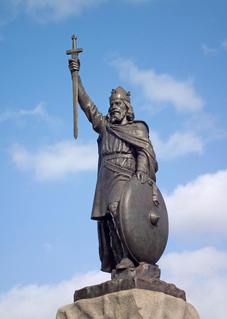At this point in time the position England was in can be summed up in one famous tale, that is, King Alfred burning the cakes of some poor peasant woman who left him in charge. It is unlikely that this event ever happened, but as a tale it shows quite clearly the danger that England's last kingdom faced, and how much responsibility was placed on Alfred’s head. In reality, by the May of 878 Alfred’s Wessex was secured, and after years of fending off the Viking invaders King Alfred finally struck a deal with the Scandinavians following his famous victory at the Battle of Edington in Wiltshire.
Not only did he gain some control of these marauding Vikings, but he paved the way for the future unity of England. Soon after the Viking defeat, Alfred encouraged the Viking leader Guthrum to convert to Christianity. Guthrum’s baptism is said to have taken place at Wedmore and where, it is also said, a formal treaty, sometimes called the Treaty of Wedmore, was signed. However, historians think that this may have occurred else where and that the passing of time has merged the two events into one. Regardless of this, under this ‘treaty’ the vikings agreed to leave Wessex in peace and return to East Anglia to the area we know now as Danelaw.
King Alfred the Great is an English hero, who in my opinion, is a match for Henry V and outshines Richard I by miles.


 RSS Feed
RSS Feed
